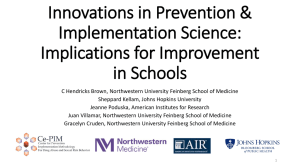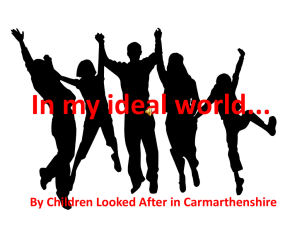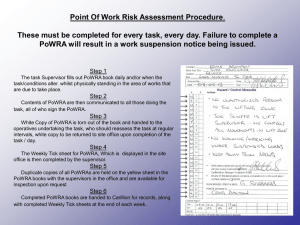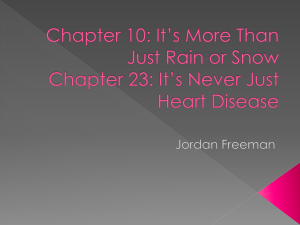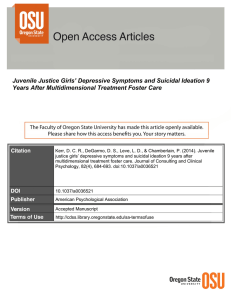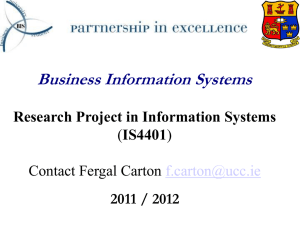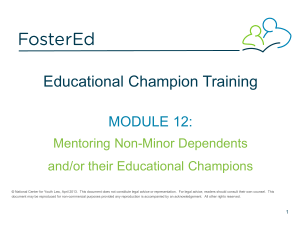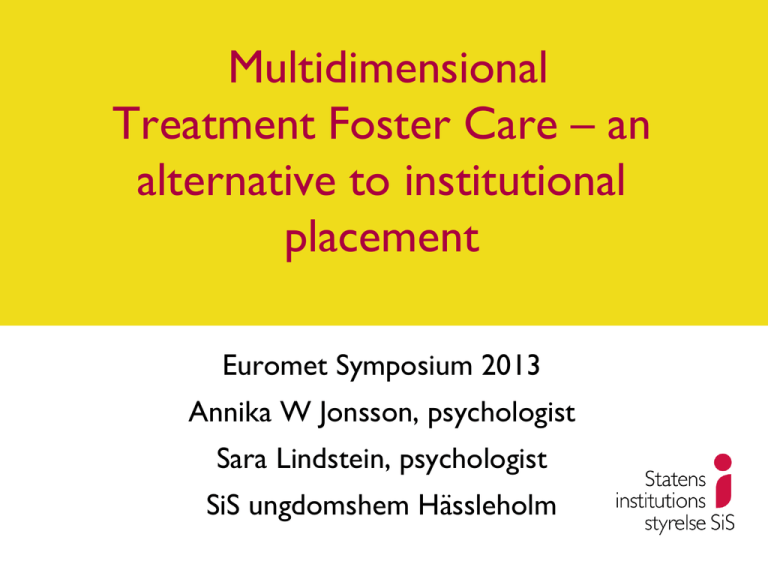
Multidimensional
Treatment Foster Care – an
alternative to institutional
placement
Euromet Symposium 2013
Annika W Jonsson, psychologist
Sara Lindstein, psychologist
SiS ungdomshem Hässleholm
Background Information
OSLC, where MTFC was developed, was started in
the 1970’s by Gerald Patterson and John Reid in
Eugene, Oregon, USA
The MTFC program is based on Social Learning
Theory and Coercion Theory
MTFC is evidence- and manualbased
How is MTFC different?
MTFC places one child with a family at a time
Placement in MTFC is approx. one year
MTFC uses a team approach to treatment
Foster Parents are members of the team
For one of the foster parents, MTFC is a full-time job
Programs are individualized for each youth
Support for foster parents is available 24 hours a day, 7
days a week
Foster parents meet regularly with their supervisor and
other foster parents in the program to learn from and
support each other
Main purpose of MTFC
Youth returning to a permanent living with his/her family.
For all treatment components of MTFC, this is focus
from day one.
MTFC Key stones
Reinforcement of pro-social behaviors
Close supervision
Fair, consistent and predictable limits and
consequences
Supportive relationships
Minimize association with peers who may be a bad
influence
Who is served by MTFC?
Children and youth in need of out-of-home placement due
to serious behavioral and emotional problems and their
families
MTFC-P serves children 3 – 6 years old
MTFC-C serves children 7 – 11 years old
MTFC-A serves youth 12 – 17 years old
Those who may have failed in prior placements or
treatments
Can be used as step-down from institutional placements
Can be used as diversion from institutional placements
Exclusionary criteria
Absence of serious behavior problems
Substance abuse is the only problem behavior
Sex offending/acting out is the only problem
behavior
Active suicidal/homicidal
Psychosis
Schizophrenia
Bi-polar disorder with psychotic features
The MTFC Universe
Core Components for MTFC Parents
Conducts daily behavior management point and level
system
Daily telephone contact and data collection
Weekly support and training meetings
24-hour, 7-day on-call program supervisor
Core Components for Youth
Daily mentoring by MTFC parents
Daily structure and support via a point and level
system
Daily school card
Weekly contact with parents and frequent home visits
Weekly individual therapy
Weekly skill building and advocacy
Close supervision of whereabouts and associations
Psychiatric consultation
Point chart
Name
Date
Points Things to Do to
Earned Points
5
UP ON TIME
5
READY IN MORNING
5
MORNING CLEANUP
5
GO TO SCHOOL , CARRY SCHOOL CARD
10
ON TIME FOR CLASS
10
BEHAVIOR IN CLASS
10
READ AND STUDY
5
ATTEND THERAPIES & SKILLS TRAINING
5
ATTEND LEISURE ACTIVITY
10
BEING ON TIME
5
CHORE
5
DINNER WITH FOSTER FAMILY
5
ENGAGE IN FAMILY ACTIVITIES
0-10
PRO-SOCIAL PEER CONTACT
5
ATTITUDE
5
BED ON TIME
5
CELL PHONE TO FOSTER PARENTS
DAILY TOTAL (115)
Earned Bonus
Total
Point and Level System
Three levels
Opportunities to earn points for compliance, prosocial
behavior
Points are lost for rule violations, misbehavior
Provides a framework within which interaction can
occur without engagement in conflict
Level 1
During Level 1, the youth settles into the MTFC family
home and begins to build relationships. In Level 1, there
is very close supervision and immediate reinforcement.
The youth earns points for routine daily activities.
The youth is supervised at all times.
No homevisits, no time with friends, no cell phone
The youth should be able to earn approx. 100 points a day.
It takes 2,100 points or about 3 weeks to move out of
Level 1.
Level 2
Level 2 will be individualized according to what was
learned during level 1.
Youths can earn 805 points a week.
Bonuspoints earned in one week are used to buy privileges
for the next week.
They learn to delay gratification, plan ahead, and work
toward a goal.
The amount and quality of privileges increases.
They can be demoted to level 1 for low point days.
It takes 110 days to earn enough points to move to level 3.
Level 3
Level 3 is a maintenance phase. The youth is allowed
more free time and a higher quality of privileges in level
3.
The youth must earn 90 points a day.
Youth and foster parents/family are more independent
in relation to the program supervisor
Activities must be approved in advance.
Serious violations can result in a demotion to level 1.
Core Components for Families
Weekly family counseling focusing on Parent Management
Training: teaching parents to use clear and consistent
discipline, be warm and supportive and to supervise their
children closely
Instruction in behavior management methods
Home visits with crisis back-up
24-hour, 7-day on call to program supervisor
Research results – Swedish 2-year-follow-up
Comparison MTFC-group (n = 20) and TAU-group (treatment as
usual)(n = 20)
MTFC had significantly reduced all self-reported problem
symptoms (internalized and externalized) for youths and
mothers.
TAU had significantly reduced some self-reported problem
symtoms
MTFC had reduced all self-reported problem symtoms with
at least 30%
Pia Kyhle Westermark, 2009, IMS & Socialhögskolan, Lunds universitet
Swedish 3-year-follow-up
Comparison SiS assessment + MTFC-treatment (n = 19) vs
SiS assessment +TAU (n = 27)
Violent crime during the three-year follow-up period
0 % in the MTFC-group vs 41 % in the TAU group
Days in locked wards during the follow up period:
MTFC average 23 days vs TAU average 87 days
Third year – significantly lower frequency of criminality
in the MTFC-group
On going study, Bergström & Höjman, Lund university/SiS
Aftercare
Aftercare helps to prevent old patterns of problem
behavior to return. Without it, problem behaviors most
often reoccur. Support is needed for a long time.
The youth level of functioning after the termination of the
MTFC-program is more dependent on the situation at
home then it is on the level of functioning during the
MTFC-placement.
Multidimensional work is necessary also in the phase of
aftercare; family, school, friends and leisure activities.


